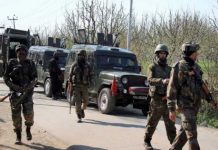 On January 26, Defence Minister Rajnath Singh said that no power on earth can now stop Kashmiri pandits from retuning to Kashmir. He was obviously referring to a post Article 370 Kashmir scenario in the state turned union territory where the centre was in a position to take any necessary action to facilitate return of Pandits without having to deal with the state government, as was the case earlier. Vice President Venkiah Naidu had earlier said it was the duty of the country as a whole and the Kashmiri people in particular to see that the “sons of the soil, who were driven out due to killings and terror instigated by India’s neighbour, are provided safety and security upon their return.”
On January 26, Defence Minister Rajnath Singh said that no power on earth can now stop Kashmiri pandits from retuning to Kashmir. He was obviously referring to a post Article 370 Kashmir scenario in the state turned union territory where the centre was in a position to take any necessary action to facilitate return of Pandits without having to deal with the state government, as was the case earlier. Vice President Venkiah Naidu had earlier said it was the duty of the country as a whole and the Kashmiri people in particular to see that the “sons of the soil, who were driven out due to killings and terror instigated by India’s neighbour, are provided safety and security upon their return.”
If anything, these statements emanating from the top echelons of the government exhibit a certain determination to ensure return of Pandits to Kashmir that didn’t exist earlier. This has engendered hope among Kashmiri Pandits. The hashtags like Hum Wapas Aayenge are trending on Twitter and triggering debate, some if it very contentious. Media has also focussed on the issue in a big way. This has brought renewed attention to plight of Pandits.
But will this attention lead to something concrete for Pandits? Will this time around they be able to return to the Valley? The answer to this is moot. For one, there’s no plan in public domain whereby Pandits are sought to be brought back? In 2015, however, a plan was reported in the media which talked about creation of separate townships for Pandits. According to the proposal which was not then denied by the union government, the centre had asked the then state government to identify and earmark 16,800 kanals of land in three districts of the Valley — Anantnag, Baramulla and Srinagar — where the Pandit families could be resettled.
Each township, according to the proposal doing the rounds then, would accommodate at least 75,000-100,000 people. The government will set up a medical college and engineering colleges for each settlement. Under the plan, 12 police stations would be provided to ensure security to the colonies.
The Centre will also provide housing assistance, transit accommodation, cash relief for a period of two years after the Pandits return, besides student scholarships, employment in state government service, assistance to farmers and waiver of the interest component of loans taken by the members of the community before they fled the Valley in 1990.
Does this plan still exist? It is not known yet. But considering that the centre has shown its partiality towards establishing separate colonies in the Union Territory, the form of eventual Pandit resettlement may not markedly depart from the above plan.
But as with everything else about J&K, the Pandit return to Valley is not only about the packages, it is also about politics. The separate settlements for the community have always been stiffly opposed by the separatist and civil society groups who instead want Pandits reintegrated back into Kashmiri society, a demand that resonates with the majority community in the Valley.
But the situation since has altered drastically. Article 370 has also done away with Article 35A, something that barred outsiders from settling down in J&K. Now even people from outside the state can buy land in J&K and become citizens. What is more, outsiders can also apply for jobs. That is, if the centre doesn’t bring in the domicile law and allow only state subjects to apply for the local jobs, as is being proposed.
So, getting Pandits back to the Valley shouldn’t be a problem. But the issue is far more complex than it appears. For one, there has never been an opposition in the Valley to return of Kashmir but the mode of Pandit resettlement could run up against the conflict-riven local politics. This is what the central government should guard against and try to engage with rather than rush into resetting Pandits in the Valley as unilaterally as the revocation of Article 370.
letters@tehelka.com












